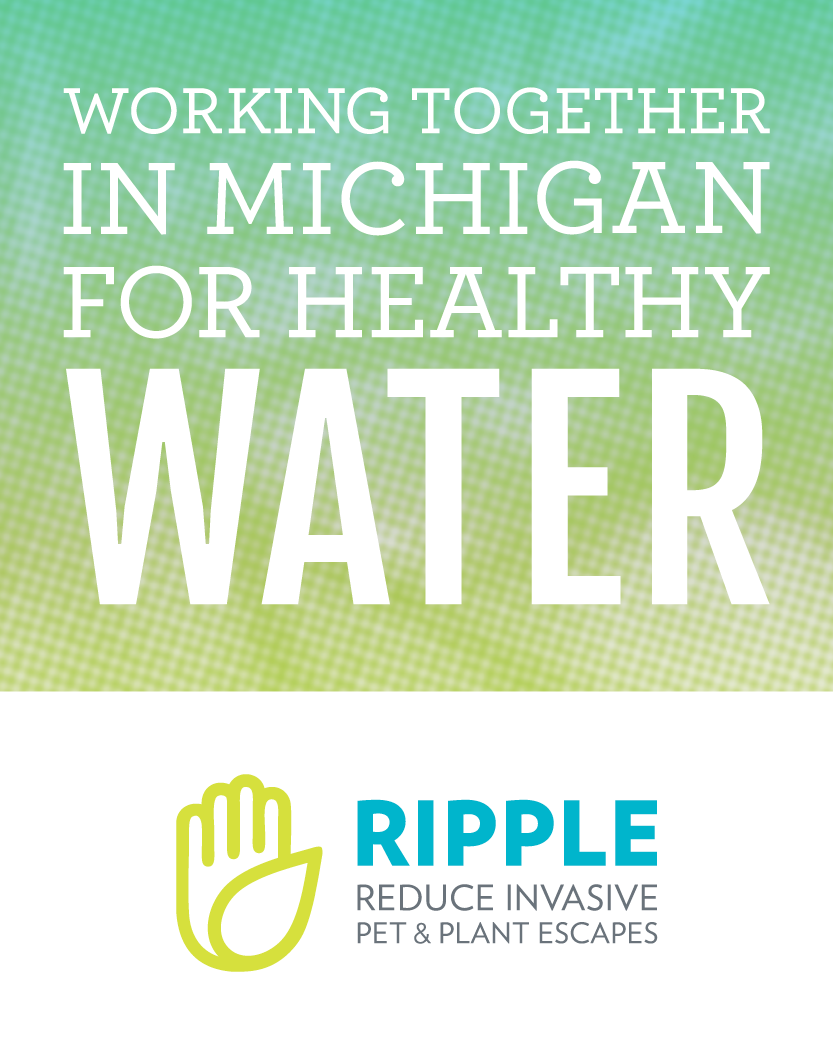 Aquariums and water gardens add beauty and tranquility to our homes. Many plants and animals that we use in aquariums and backyard ponds have been imported from other parts of the world. While they are excellent to enjoy they may be harmful to Michigan's native ecosystems if they are released into the wild. Although Michigan’s winter temperatures stop some exotic species from reproducing in our lakes and streams, this is not always the case. Some species survive and thrive, negatively impacting the environment, decreasing recreational opportunities and causing severe economic consequences.
Aquariums and water gardens add beauty and tranquility to our homes. Many plants and animals that we use in aquariums and backyard ponds have been imported from other parts of the world. While they are excellent to enjoy they may be harmful to Michigan's native ecosystems if they are released into the wild. Although Michigan’s winter temperatures stop some exotic species from reproducing in our lakes and streams, this is not always the case. Some species survive and thrive, negatively impacting the environment, decreasing recreational opportunities and causing severe economic consequences.
It is never safe to release water garden or aquarium plants and animals into the natural environment, even if they appear to be dead.
Together we can keep Michigan’s waterways healthy and pure
- Never release an aquatic plant or animal into a waterway (lake, river, storm drains, retention ponds)
- Give or trade unwanted fish or plants with another hobbyist, retailer, environmental learning center, aquarium or zoo. Use the RIPPLE Fresh Water Protector network map to find a participating retailer nearest you.
- Unwanted hitchhiking species are common. Inspect and rinse any new plants to rid them of seeds, plant fragments, snails and fish.
- Build water gardens away from other waters. Check out the MSU Extension Smart Gardening fact sheet on water gardening to learn more.
- Contact a veterinarian or pet retailer for guidance on humane disposal of animals.
RIPPLE Fresh Water Protector Network
Looking to rehome fish, crayfish, snails, or other organisms commonly found in aquariums or water gardens? RIPPLE partners with retailers across the state to ensure they have the tools necessary to answer your rehoming questions. Many independent retailers may also accept unwanted organisms if they are in healthy condition. They can also point you to other rehoming resources. Use the map below to find the nearest RIPPLE Fresh Water Protector.
Aquarium and Water Garden MSU Extension News
-
No silver lining: Invasive goldfish in the Great Lakes
Published on February 16, 2023
Seeing an orange-colored goldfish in your local lake is actually a sign of bad luck for native fish and plants. -
Enhance your outdoor living spaces with a water feature
Published on July 29, 2022
Wildlife sightings, soothing sounds, and scenic beauty are just a few benefits from having a backyard water feature. -
Celebrate Michigan’s Aquatic Invasive Species Awareness Week
Published on July 1, 2022
Become familiar with aquatic invasive species and how best to prevent their spread. -
How to report suspicious fish and aquatic plant sightings
Published on May 18, 2022
Reporting unusual organisms protects the environment from unwanted invasive species. Be part of the solution by sharing your observations with biologists.
The Reduce Invasive Pet and Plant Escapes (RIPPLE) program offers information to aquarium and water gardener professionals, retailers and hobbyists about what to do with unwanted plants and animals so they are not introduced into Michigan's lakes and streams.
RIPPLE's education initiatives are coordinated by Michigan State University Extension in partnership with the Michigan Department of Environment, Great Lakes and Energy, Michigan Department of Natural Resources and the Michigan Department of Agriculture and Rural Development. RIPPLE is funded by the Michigan Invasive Species Grant Program.




Paige Filice
Natural Resources Educator
filicepa@msu.edu
517-676-7291







 Print
Print Email
Email